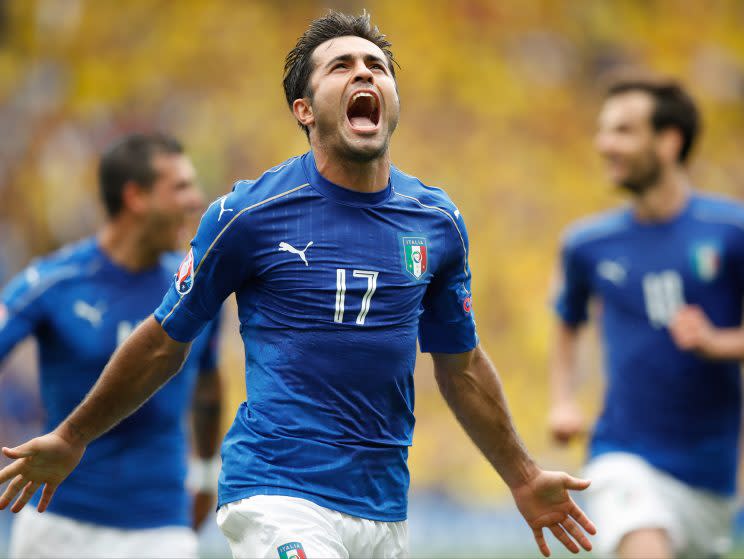Massimo Carrera: Meet the coach who snubbed Antonio Conte's Chelsea revolution to go it alone in Russia
While Antonio Conte took his first training session with Chelsea there was an important figure missing. Massimo Carrera — a trusted lieutenant — had served Conte well during spells with Juventus and Italy, and was considered by many to be a key member of his backroom team.
When Conte was absent from the touchline at Juventus due to a ban for failing to report attempted match fixing, it was Carrera that took control. Speaking in a recent interview Carrera said of Conte: “Working with him is like getting a university degree”.
Consequently, there was surprise when the 52-year-old opted not to follow Conte to Stamford Bridge, instead opting to join Spartak Moscow.

“They [Chelsea] called me after the Euros,” Carrera told La Stampa. “I was sure I could have gone to Chelsea with Conte, and I very much liked the idea, but this was something different.”
Joining the Russian club as an assistant to head-coach Dmitri Alenichev, the pair had met in Lyon following Italy’s Euro 2016 game against Belgium. Alenichev preferred an attacking style, but struggled defensively. The thought was the Italian could improve the defence, but Carrera’s role quickly evolved into something greater.
Despite being a playing legend that had won four Russian Premier League titles with Spartak in the 90s, Alenichev had proven to be a poor managerial choice. His debut campaign saw the team finish in fifth place, (15 points behind rivals CSKA Moscow) with the club’s owner Leonid Fedun labelling their performance ‘a disgrace’.

During the off-season Fedun was unable to convince his preferred replacement — Kurban Berdyev — to join the club, and somewhat begrudgingly stuck by Alenichev.
The head-coach was living on borrowed time, and following a shock defeat to Cypriot side AEK Larnaca in Europa League qualifying, resigned. Many expected Fedun to try and replace him with Berdyev. However, the pair were unable to reach a compromise regarding responsibilities as Berdyev sought full control.
Meanwhile Carrera was promoted to caretaker and worked diligently with the first team. “In August after the elimination in the Europa League preliminary round and the resignation of [Dmitri] Alenichev, they asked me: ‘do you feel like going on the bench for two games’,” Carrera said.
Performing well, it led to the Italian’s permanent appointment in mid-August. “I am glad and proud that the club chose me, and we only have one goal — to win. I will work day and night and put my soul into this team, so that it returns where it belongs,” he said during his unveiling.
Carrera operates with enthusiasm on the sidelines and adores the game. So much so, he played on in Italy’s fourth division until he was 44 years old. Now coaching, his high-energy displays in the technical area have transferred onto the field, with Spartak taking 16 of 18 points in their first six games. His side are defensively stern, quick on the attack, while also sharing the intensity one might associate with a Conte team.
The former assistant is a man with his own ideas though, and is yet to employ the three-man backline that has become synonymous with Conte this season. Tending instead to name a 4-2-3-1 formation, he has not been afraid to make changes and play five at the back. When it comes to his tactical approach, Carrera has also spoken of trying to bring an intelligent Italian style to Russia where he claims, “football is less tactical and teams are less organized.”
Perhaps lacking in diplomacy, it is difficult to argue with him given the team’s results. Currently top of the Russian Premier League, Spartak also managed a 3-1 derby success against CSKA Moscow in October.
Carrera remarked afterwards that the atmosphere reminded him of the Milan and Turin derbies, and although Leonid Slutsky’s side was depleted through injury it does not dilute the achievement. “It’s about the growth of the team, who are getting better every day and giving their heart and soul on the pitch,” Carrera said afterwards.
The team has not been without its struggles though. In September, they were dumped out of the Russian cup by a team in the second division — Khabarovsk. They followed that up with a 1-0 home defeat to mid-table UFA and then a 4-2 loss away to Zenit St. Petersburg.
Yet, credit must go for Carrera and his players for recovering. They earned six straight victories off the back of their defeat to Zenit, before that run was surprisingly halted in mid-December by a 4-0 loss to relegation threatened Krylya Sovetov. Able to recover once again they finished out the first part of the season with a 2-1 win against Rubin Kazan.
That left them five points ahead of nearest rivals Zenit, but they must now wait until March for the campaign to resume. In the meantime Carrera will hope Spartak can resist any bids for star-man Quincy Promes. Linked with Jurgen Klopp’s Liverpool, Promes’ future seems safe after the club’s owner made positive noises about rejecting any potential bids.
Spartak Moscow in love with their coach Massimo Carrera – a former protege of – Conte. pic.twitter.com/lqeg67gpIz
— The Front 3 (@TheFront3) January 19, 2017
For now though, Spartak fans are dreaming. Often in the shadow of rivals CSKA, they have not lifted a trophy since 2003 nor a league title since 2001. As for Fedun, this could be the crowning achievement of his time in charge, a period that began by hiring an Italian — Nevio Scala.
A serendipitous situation, the supporters are clearly taken with Carrera. Earlier in the season they produced a banner which read, ‘Forza Massimo’. A testament to their faith in the Italian, it was a sentiment likely shared by his good friend Conte some 1,600 miles away in London.


